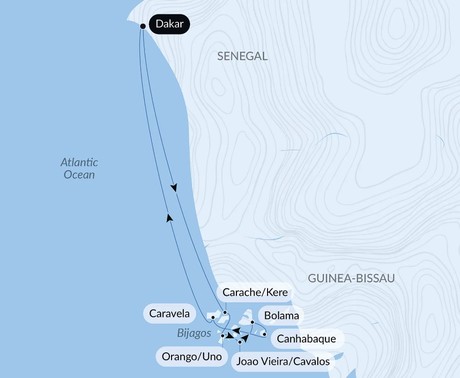Adventure in the Bissagos Islands - 9 Day Cruise from Dakar
In the little-known reaches of the Atlantic, off the coast of Guinea-Bissau, where the infinite blue of the ocean meets the lush green of the islands, lies a rare jewel: the Bissagos Islands. Now a UNESCO Biosphere Reserve, this is one of the best preserved archipelagos in the world. It comprises 88 islands, most of which are uninhabited. In many parts, this environment is still completely untouched by man, so these islands offer the chance of a unique and authentic experience to the few visitors who explore them. On this unique voyage, discover some of these mysterious islands, lands of ancient civilisations and a refuge for many species.
Highlights
• Explore the Bissagos, a magical archipelago and UNESCO Biosphere Reserve, through 9 islands: Carache, Kere, Caravela, Orango, Uno, Bolama, Cavalos, Joao Vieira and Canhabaque.
• Discover the landscapes (heavenly beaches, mangroves, savannahs, mangrove forests, baobabs, lagoons, ancient kapok trees) and the wildlife (you may see sea turtles, dolphins, manatees, vervet monkeys and more).
• Activities: opportunities for dinghy outings and shore visits with your naturalist guides, visits to traditional villages, encounters with the Bissagos community, etc.
On the tip of the African continent, the buzzing capital of Senegal stretches along the narrow peninsula of Cape Verde. You may be overwhelmed by its sheer size, but Dakar will win you over with its richly diverse districts, appealing cultural scene and rich natural surroundings. In the historic centre, you'll enjoy the pell-mell of colours and tasty delights in Kermel market. Far from the effervescence of the city, Gorée Island, a UNESCO World Heritage Site, is known as a place of remembrance, having once been a slave trade outpost. On the other side of the plateau, the wild Madeleine islands are protected by a national park.
During your journey at sea, make the most of the many services and activities on board. Treat yourself to a moment of relaxation in the spa or stay in shape in the fitness centre. Depending on the season, let yourself be tempted by the swimming pool or a spot of sunbathing. This journey without a port of call will also be an opportunity to enjoy the conferences or shows proposed on board, depending on the activities offered, or to do some shopping in the boutique or to meet the PONANT photographers in their dedicated space. As for lovers of the open sea, they will be able to visit the ship’s upper deck to admire the spectacle of the waves and perhaps be lucky enough to observe marine species. A truly enchanted interlude, combining comfort, rest and entertainment.
In the midst of a rich natural environment, you will enjoy a fascinating encounter with the Bijagos, who have been successful at taming their environment and preserving their ancestral way of life. Five villages provide a home for the island’s few thousand inhabitants, who rely on a subsistence economy: they take from nature only what they need, they cultivate rice, breed chickens and pigs, fish on a small scale and use all the parts of the oil palm. Cob huts with thatched roofs are the traditional dwellings. Among other things, you will be able to enjoy a wonderful show of authentic traditional dancing.
The private island of Kere is an unspoiled Eden, a one-hectare (two-acre) stretch of tropical forest in the heart of the Bissagos Islands. One original feature of this island is that a small, sustainable and fair-trade ecotourism business was developed upon it. On the island’s magnificent beach, a Frenchman has set up a business to show people around this exceptional natural environment or to take them out for some game fishing, particularly in search of tarpon, a fish weighing over a hundred kilos (220 pounds). The bungalows made from earth and straw blend into the idyllic setting and reflect the mindset of the islet’s owner: authentic and respectful of nature and people.
Some 20 kilometres off the coast of west Africa, the Bissau-Guinean archipelago of Bissagos is famous for its abundant biodiversity. The richness of its marine animal and plant life afforded it the status of Biosphere Reserve by UNESCO: dolphins, green tortoises, monkeys, striped antelopes and hundreds of thousands of migrating birds find refuge here. Composed of five islands and several islets, Orango is the largest and most mysterious island in the archipelago. Its national park and marine protected area lie in the heart of the Biosphere Reserve. During your zodiac outings, you will set off to discover this preserved environment, home to the Bijogo people, the true custodians of this sanctuary.
Covered in beautiful savannah, paddy fields and lush forests, the island of Uno, or Ilha de Uno, is one of the most populated in the Bissagos archipelago. In its many villages, life follows the pace of the everyday scenes and traditions of the Bissago people. The lifestyle of these island people remains relatively untouched by colonial domination and external influences, and still honours animist beliefs and rites, such as the fanados, which are coming-of-age initiations for young men and women that involve them spending four months in the forest with the village elders. By sanctifying the natural environment, the islanders are protecting the archipelago’s unique biodiversity.
In the far south-east of the Bissagos Islands, João Vieira is a small unspoiled island in the João Vieira and Poilão Marine National Park. This park, where a number of sacred sites can be found, is home to a wonderful biodiversity. On the practically uninhabited island of João Vieira, the Bijagos have set up temporary camps for fishing or for collecting the fruit of oil palms. Like everywhere else in the archipelago, the local population displays ingenuity to adapt to this incredible environment.
A UNESCO Biosphere Reserve, the island of Cavalos is the second-largest nesting site in West Africa. Here you will be able to observe many bird species, including terns, in particular near the freshwater lake. Take a stroll on the beach full of shells, stretching all the way around the island’s 6-km (3.8-mile) circumference. Some rocks have mango trees growing on them, which just rise above the surface during high tide. The interior of the island, blanketed in palm trees and high grasses, is inhabited by a colony of wild pigs.
Bolama, the capital of Portuguese Guinea from the late 19th century to the end of the 1930s, is shrouded in the surreal and poetic atmosphere of a ghost town forgotten by time. Along the streets covered in ochre earth, the vestiges of neoclassical colonial buildings hint at what was once the sumptuous government palace or the governor’s residence. Now neglected, this hard-to-reach natural harbour surrounded by mangrove swamps once served as an outpost for keeping a close eye on the Guinean population that had come to seek refuge on these remote islands of the Bissagos archipelago to escape their colonisers.
Canhabaque Island, also known by the name Roxa, is covered in lush vegetation and boasts pretty beaches alternating with rocky formations. The first island in the archipelago to be inhabited, it is today home to a community of around 2,500 inhabitants, spread across various tabancas (rural villages). Long closed to tourism, it is considered the most traditional island in the whole archipelago in terms of customs and lifestyle. It competes with Caravela for the reputation of the most beautiful island. It has an animist and matrilineal society; women are highly predominant in the management and maintenance of balance in the tabancas.
Dotted with authentic and wild landscapes, the Bissagos archipelago is a constellation of islands covered in savannah, forests of palm trees, mangrove trees, silk-cotton trees, baobabs and, in large part, mangrove swamps. From the island of Caravela, you will be able to set out in a Zodiac® dinghy to explore the mangrove and observe the African grey hornbill, the palm-nut vulture, the kingfisher, the weaverbird and some of the many species that fly to this region each year. It is the second most important site for migratory birds in West Africa, after Banc d’Arguin in Mauritania: herons, curlews, red-chested swallows. In full immersion, far from the beaten track, your discovery of the archipelago will take on an air of adventure.
On the tip of the African continent, the buzzing capital of Senegal stretches along the narrow peninsula of Cape Verde. You may be overwhelmed by its sheer size, but Dakar will win you over with its richly diverse districts, appealing cultural scene and rich natural surroundings. In the historic centre, you'll enjoy the pell-mell of colours and tasty delights in Kermel market. Far from the effervescence of the city, Gorée Island, a UNESCO World Heritage Site, is known as a place of remembrance, having once been a slave trade outpost. On the other side of the plateau, the wild Madeleine islands are protected by a national park.
Itineraries are subject to change.
|
Book now |
Deluxe Stateroom

Prestige Stateroom Deck 4

Prestige Stateroom Deck 5

Prestige Stateroom Deck 6

Deluxe Suite Deck 5

Deluxe Suite Deck 6

Deluxe Suite Deck 4

Deluxe Suite

Prestige Suite Deck 5

Prestige Suite Deck 6

Privilege Suite Deck 6

Privilege Suite

Grand Deluxe Suite

Grand Deluxe Suite Deck 6

Owner's Suite

|
Book now |
Deluxe Stateroom

Prestige Stateroom Deck 4

Prestige Stateroom Deck 5

Prestige Stateroom Deck 6

Deluxe Suite Deck 6

Deluxe Suite Deck 5

Deluxe Suite Deck 4

Deluxe Suite

Prestige Suite Deck 5

Prestige Suite Deck 6

Privilege Suite

Privilege Suite Deck 6

Grand Deluxe Suite

Grand Deluxe Suite Deck 6

Owner's Suite

|
Book now |
Deluxe Stateroom

Prestige Stateroom Deck 4

Prestige Stateroom Deck 5

Prestige Stateroom Deck 6

Deluxe Suite Deck 5

Deluxe Suite

Deluxe Suite Deck 6

Deluxe Suite Deck 4

Prestige Suite Deck 5

Prestige Suite Deck 6

Privilege Suite

Privilege Suite Deck 6

Grand Deluxe Suite

Grand Deluxe Suite Deck 6

Owner's Suite

|
Book now |
Deluxe Stateroom

Prestige Stateroom Deck 4

Prestige Stateroom Deck 5

Prestige Stateroom Deck 6

Deluxe Suite Deck 4

Deluxe Suite Deck 6

Deluxe Suite

Deluxe Suite Deck 5

Prestige Suite Deck 5

Prestige Suite Deck 6

Privilege Suite

Privilege Suite Deck 6

Grand Deluxe Suite

Grand Deluxe Suite Deck 6

Owner's Suite

|
Book now |
Deluxe Stateroom

Prestige Stateroom Deck 4

Prestige Stateroom Deck 5

Prestige Stateroom Deck 6

Deluxe Suite Deck 4

Deluxe Suite

Deluxe Suite Deck 6

Deluxe Suite Deck 5

Prestige Suite Deck 5

Prestige Suite Deck 6

Privilege Suite

Privilege Suite Deck 6

Grand Deluxe Suite

Grand Deluxe Suite Deck 6

Owner's Suite

|
Book now |
Deluxe Stateroom

Prestige Deck 4

Prestige Deck 5

Prestige Deck 6

Deluxe Suite Deck 3

Deluxe Suite Deck 4

Deluxe Suite Deck 5

Deluxe Suite Deck 6

Prestige Deck 5 Suite

Prestige Deck 6 Suite

Privilege Suite Deck 5

Privilege Suite Deck 6

Grand Deluxe Suite Deck 5

Grand Deluxe Suite Deck 6

|
Book now |
Deluxe Stateroom

Prestige Deck 4

Prestige Deck 5

Prestige Deck 6

Deluxe Suite Deck 3

Deluxe Suite Deck 5

Deluxe Suite Deck 6

Deluxe Suite Deck 4

Prestige Deck 5 Suite

Prestige Deck 6 Suite

Privilege Suite Deck 5

Privilege Suite Deck 6

Grand Deluxe Suite Deck 5

Grand Deluxe Suite Deck 6

|
Book now |
Deluxe Stateroom

Prestige Deck 4

Prestige Deck 5

Prestige Deck 6

Deluxe Suite Deck 4

Deluxe Suite Deck 5

Deluxe Suite Deck 6

Deluxe Suite Deck 3

Prestige Deck 5 Suite
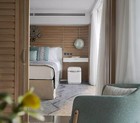
Prestige Deck 6 Suite

Privilege Suite Deck 6

Privilege Suite Deck 5

Grand Deluxe Suite Deck 5

Grand Deluxe Suite Deck 6

|
Book now |
Deluxe Stateroom

Prestige Deck 4

Prestige Deck 5

Prestige Deck 6

Deluxe Suite Deck 3

Deluxe Suite Deck 4

Deluxe Suite Deck 5

Deluxe Suite Deck 6

Prestige Deck 5 Suite

Prestige Deck 6 Suite

Privilege Suite Deck 5

Privilege Suite Deck 6

Grand Deluxe Suite Deck 5

Grand Deluxe Suite Deck 6

|
Book now |
Deluxe Stateroom

Prestige Deck 4

Prestige Deck 5

Prestige Deck 6

Deluxe Suite Deck 3

Deluxe Suite Deck 4

Deluxe Suite Deck 5

Deluxe Suite Deck 6

Prestige Deck 5 Suite

Prestige Deck 6 Suite

Privilege Suite Deck 6

Privilege Suite Deck 5

Grand Deluxe Suite Deck 5

Grand Deluxe Suite Deck 6

Vessel Type: Luxury Expedition / Cruise Ship
Length: 131 metres
Passenger Capacity: 184
Built: 2019-2020
Featuring innovative and environmentally-friendly equipment, elegantly designed staterooms, spacious suites with large windows, and lounge areas that open onto the outside, this new limited-capacity yacht boasting just 92 staterooms and suites will offer you a truly unique cruising experience.
As the first ship in a new series that remains true to the Ponant spirit, Le Bellot will embody the unique atmosphere that is the cruise line’s hallmark: a subtle blend of refinement, intimacy and comfort.
Aboard this ship that flies the French flag, you will experience the incomparable pleasure of an intimate cruise, with the possibility of exploring an ever-increasing range of destinations in an ethnic-chic ambiance with luxury service.
Experience a luxurious setting where the accent is on authenticity and passion for travel.
RESTAURANTS
As it is an essential part of French culture, gastronomy will naturally have pride of place aboard this new ship.
To the back of Deck 4, you will find a 260 m² panoramic restaurant which can accommodate all of our passengers in a single sitting. Designed differently to that on our other ships, this dining area, which opens onto the outside, will have a buffet of salads, desserts and cheeses at your disposal. Our discreet and attentive crew will provide table service for hot meals.
In a relaxed atmosphere, an outdoor grill on Deck 3 will serve grilled meats with a variety of salads and desserts.
PUBLIC AREAS
Le Bellot has many common areas that are designed and equipped to meet all of your needs while preserving the intimacy of each passenger.
A 140 m² reception area includes:
A reception/concierge desk,
An excursions desk,
The ship’s administrative services,
The sales office, manned by our Guest Relations Officer,
Our 50 m² boutique which sells clothing, jewellery, beauty products, postcards and various accessories,
Toilets accessible to passengers with reduced mobility.
A new hydraulic platform with adjustable height provides:
Easier boarding than on any other cruise ship,
Easier Zodiac embarkation and disembarkation for expeditions,
Easier access to the sea for swimming and practising various water sports such as kayaking or paddle-boarding.
A pool deck offering:
A pool with a panoramic view, equipped with a counter-current swimming system,
A pleasant solarium,
An outdoor bar and lounge with armchairs and sofas.
A 200 m² main lounge which can accommodate all of our passengers to share convivial moments and to host activities organised during the day or evening.
Lastly, a theatre that seats 188, equipped with:
The latest sound and lighting technology,
A LED wall as the stage backdrop, for the projection of high-resolution images and videos.




Vessel Type: Luxury
Length: 127 metres
Passenger Capacity: 92 cabins
Built: 2017/2018
Featuring innovative and environmentally-friendly equipment, elegantly designed cabins, spacious suites with large windows, and lounge areas that open onto the outside, this new limited-capacity yacht boasting just 92 cabins and suites will offer you a truly unique cruising experience.
As the first ship in a new series, Le Champlain will embody the unique atmosphere that is the cruise line’s hallmark: a subtle blend of refinement, intimacy and comfort.
Aboard this ship that flies the French flag, you will experience the incomparable pleasure of an intimate cruise, with the possibility of exploring an ever-increasing range of destinations in an ethnic-chic ambiance with luxury service.
Experience a luxurious setting where the accent is on authenticity and passion for travel.
RESTAURANTS
As it is an essential part of French culture, gastronomy will naturally have pride of place aboard this new ship. Through its two restaurants, Le Champlain will invite you on a journey to elegance and epicureanism.
In a relaxed atmosphere, a first dining area located on Deck 3 and able to seat 70 will serve grilled meats daily, along with a variety of salads and desserts.
To the back of Deck 4, you will find a 260 m² panoramic restaurant which can accommodate all of our passengers in a single sitting. Designed differently to that on our other ships, this dining area, which opens onto the outside, will have a buffet of salads, desserts and cheeses at your disposal. Our discreet and attentive crew will provide table service for hot meals.
PUBLIC AREAS
Like Le Boréal and its sisterships, Le Champlain has many common areas that are designed and equipped to meet all of your needs while preserving the intimacy of each passenger.
A 140 m² reception area includes: A reception/concierge desk, An excursions desk, The ship’s administrative services, The sales office, manned by our Guest Relations Officer, Our 50 m² boutique which sells clothing, jewellery, beauty products, postcards and various accessories, Toilets accessible to passengers with reduced mobility.
A new hydraulic platform with adjustable height provides: Easier boarding than on any other cruise ship, Easier Zodiac embarkation and disembarkation for expeditions, Easier access to the sea for swimming and practising various water sports such as kayaking or paddle-boarding.
A pool deck offering: A pool with a panoramic view, equipped with a counter-current swimming system, A pleasant solarium, An outdoor bar and lounge with armchairs and sofas.
A 200 m² main lounge which can accommodate all of our passengers to share convivial moments and to host activities organised during the day or evening.
Lastly, a theatre that seats 188, equipped with: The latest sound and lighting technology, A LED wall as the stage backdrop, for the projection of high-resolution images and videos.

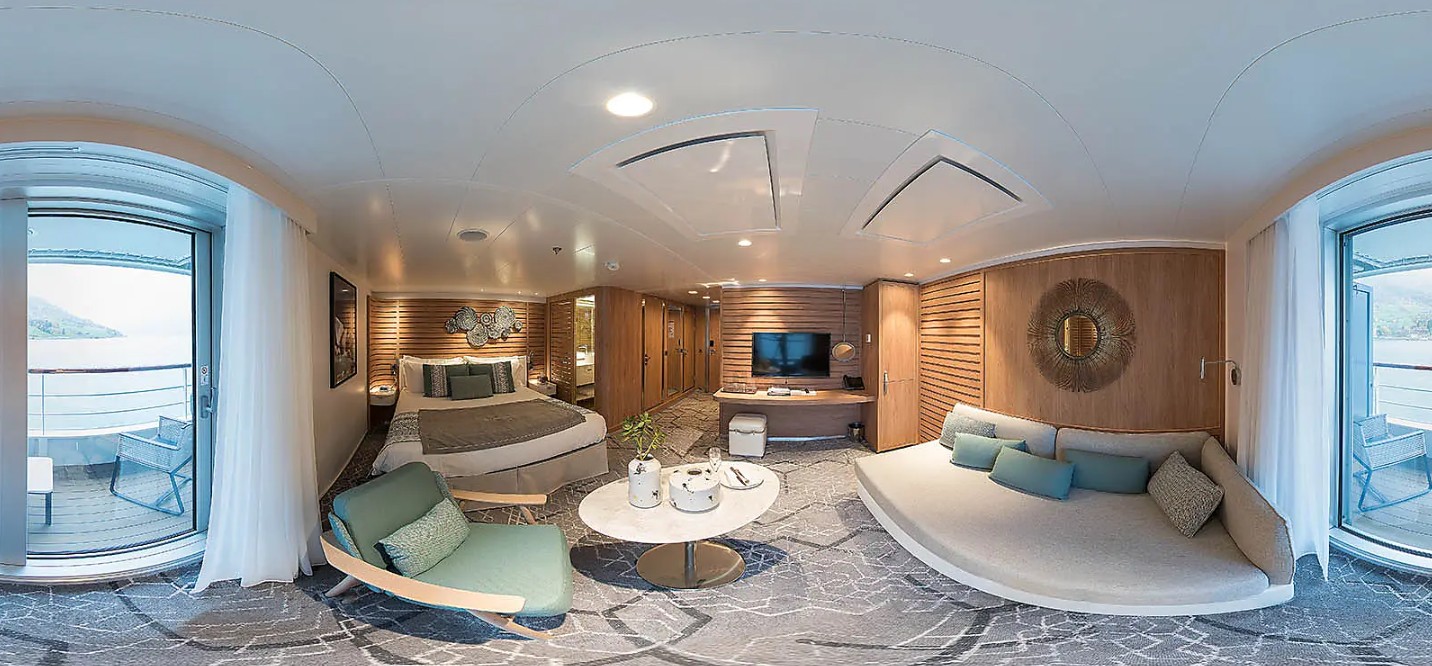


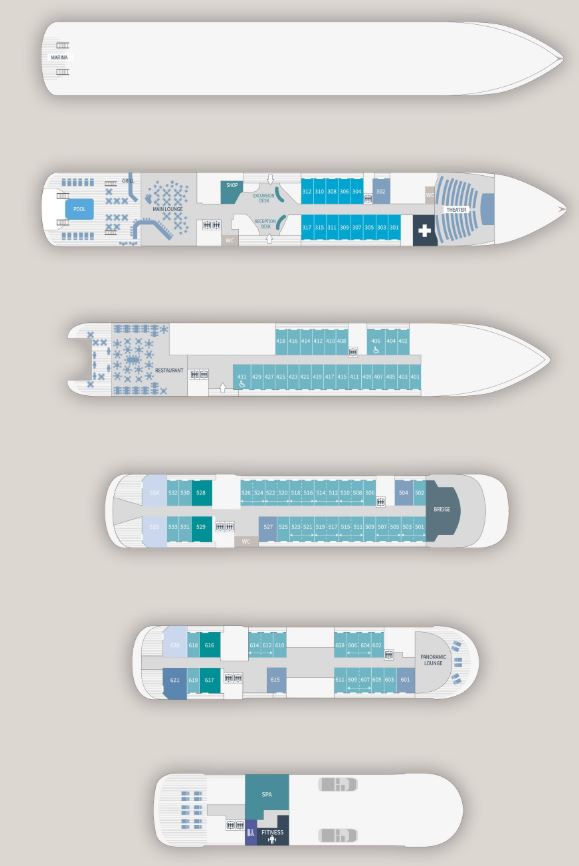
Vessel Type: Luxury
Length: 127 metres
Passenger Capacity: 92 cabins
Built: 2017/2018
Featuring innovative and environmentally-friendly equipment, elegantly designed cabins, spacious suites with large windows, and lounge areas that open onto the outside, this new limited-capacity yacht boasting just 92 cabins and suites will offer you a truly unique cruising experience.
Aboard this ship that flies the French flag, you will experience the incomparable pleasure of an intimate cruise, with the possibility of exploring an ever-increasing range of destinations in an ethnic-chic ambiance with luxury service.
Experience a luxurious setting where the accent is on authenticity and passion for travel.
RESTAURANTS
As it is an essential part of French culture, gastronomy will naturally have pride of place aboard this new ship. Through its two restaurants, Le Lapérouse will invite you on a journey to elegance and epicureanism.
In a relaxed atmosphere, a first dining area located on Deck 3 and able to seat 70 will serve grilled meats daily, along with a variety of salads and desserts.
To the back of Deck 4, you will find a 260 m² panoramic restaurant which can accommodate all of our passengers in a single sitting. Designed differently to that on our other ships, this dining area, which opens onto the outside, will have a buffet of salads, desserts and cheeses at your disposal. Our discreet and attentive crew will provide table service for hot meals.
PUBLIC AREAS
Like Le Boréal and its sisterships, Le Lapérouse has many common areas that are designed and equipped to meet all of your needs while preserving the intimacy of each passenger.
A 140 m² reception area includes: A reception/concierge desk, An excursions desk, The ship’s administrative services, The sales office, manned by our Guest Relations Officer, Our 50 m² boutique which sells clothing, jewellery, beauty products, postcards and various accessories, Toilets accessible to passengers with reduced mobility.
A new hydraulic platform with adjustable height provides: Easier boarding than on any other cruise ship, Easier Zodiac embarkation and disembarkation for expeditions, Easier access to the sea for swimming and practising various water sports such as kayaking or paddle-boarding.
A pool deck offering: A pool with a panoramic view, equipped with a counter-current swimming system, A pleasant solarium, An outdoor bar and lounge with armchairs and sofas.
A 200 m² main lounge which can accommodate all of our passengers to share convivial moments and to host activities organised during the day or evening.
Lastly, a theatre that seats 188, equipped with: The latest sound and lighting technology, A LED wall as the stage backdrop, for the projection of high-resolution images and videos.
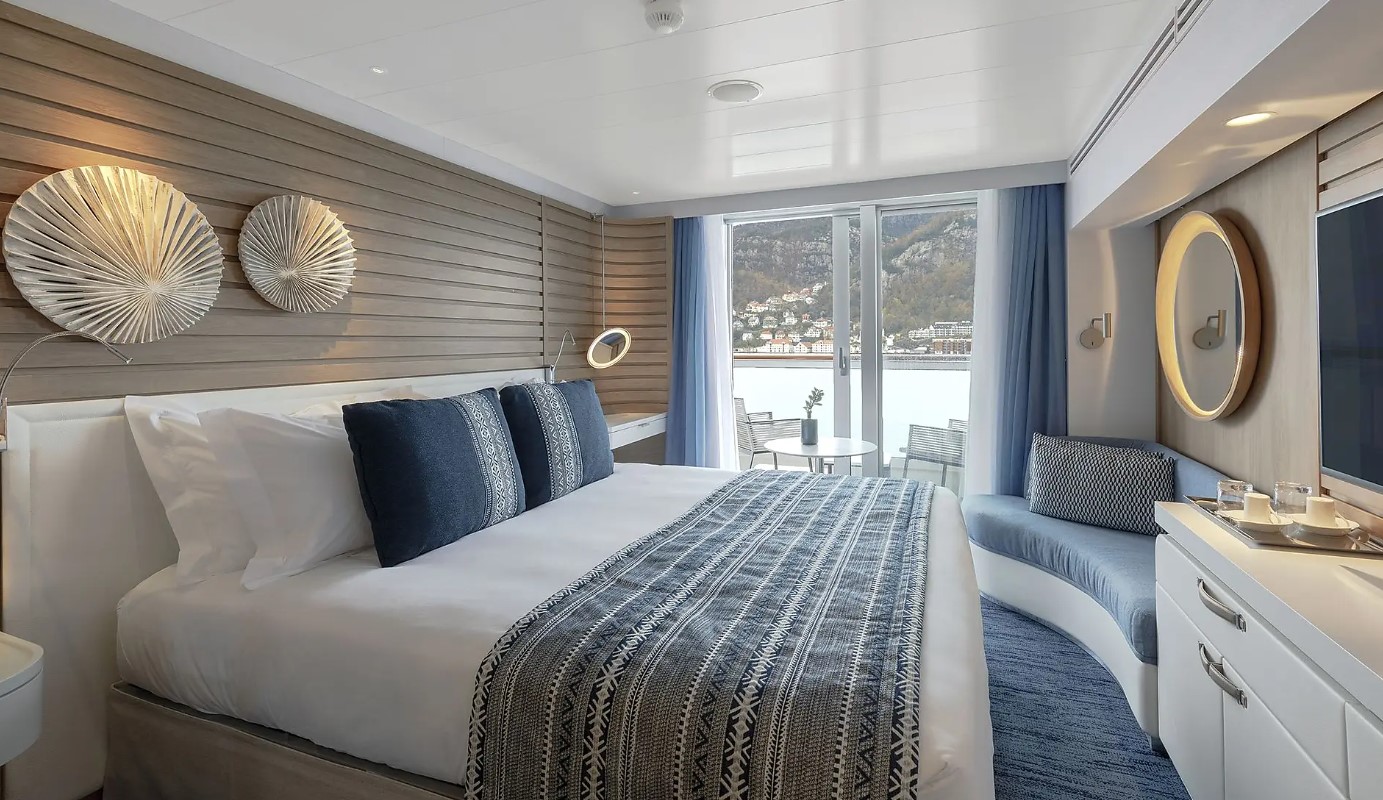






Special Offers
Online prices reflect the current brochure fare savings of up to 30%. Prices may change based on demand. Terms and conditions apply. This special offer is subject to availability. Please contact us for more details.
Inclusions
• Accommodation in stateroom
• The full meal plan
• The Open Bar: beginning with boarding, and during the duration of the cruise, a wide selection of drinks (mineral water, soft drinks, wine, beer, champagne, spirits, coffee, tea) is served on request and at any time of the day. Certain premium alcoholic beverages on the menu are not included in the Open Bar
• Free Wi-Fi internet access 24 hours a day*
• Activities offered during expedition cruises (see section "Expedition cruises")
• Access to all the common areas on board our sister ships and Ponant Explorers: fitness room, steam room, hair salon, swimming pool (sea water, heated), solarium, lounges, theater, boutique & leisure area
Exclusions
• Flights other than those mentioned in the itinerary
• Travel insurance
• Passport and visa costs if applicable
• Premium beverages package (Can be purchased on board)
• Optional Excursions where applicable
• Spa treatments on board
• Pre and post cruise accommodation unless otherwise stated
• Transfers unless specified
• Gratuities
Our Associates Include














